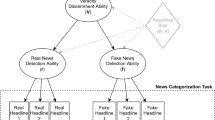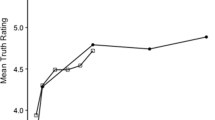Abstract
On grounds of insufficient reason, a probability of 1/K is assigned to K mutually exclusive possible events when nothing is known about the likelihood of those events. Fox and Rottenstreich (2003) present evidence that subjective probability judgments are typically biased towards this ignorance prior, and therefore depend on the partition K. Results from two studies indicate that lower-upper (imprecise) probability judgments by naïve judges also exhibit partition dependence, despite the potential that imprecise probabilities provide for avoiding it. However, beta regression reveals two kinds of priming effects, one of which is modeled by mixture distributions. Another novel finding suggests that when partition primes conflict with a normatively correct partition some judges widen their probability intervals to encompass both partitions. The results indicate that imprecise probability judgments may be better suited than precise probabilities for handling conflicting or ambiguous information about partitions.
Similar content being viewed by others
References
Camerer C., Weber M., 1992. Recent developments in modelling preferences: uncertainty and ambiguity. Journal of Risk and Uncertainty, 7, 215–235.
Fox C., Clemen R., 2005. Subjective probability assessment in decision analysis: Partition dependence and bias toward the ignorance prior. Management Science, 51, 1417–1432.
Fox C., Levav J., 2004. Partition-edit-count: Naïve extensional reasoning in judgment of conditional probabilities. Journal of Experimental Psychology: General, 133, 626–642.
Fox C., Rottenstreich Y., 2003. Partition priming in judgment under uncertainty. Psychological Science, 14, 195–200.
See K., Fox C., Rottenstreich Y., 2006. Between ignorance and truth: Partition dependence and learning in judgment under uncertainty. Journal of Experimental Psychology: Learning, Memory and Cognition, 32, 1385–1402.
Smithson M., Bartos T., Takemura K., 2000. Human judgment under sample space ignorance. Risk Decision and Policy, 5, 135–150.
Smithson M., Verkuilen J., 2006. A better lemon-squeezer? maximum likelihood regression with beta-distributed dependent variables. Psychological Methods, 11, 54–71.
Tversky A., Koehler D., 1994. Support theory: A nonextensional representation of subjective probability. Psychological Review, 101, 547–567.
Walley P., 1991. Statistical Reasoning with Imprecise Probabilities. Chapman and Hall, London.
Walley P., 1996. Inferences from multinomial data: Learning about a bag of marbles. Journal of the Royal Statistical Society, Series B, 558, 3–57.
Yaniv I., Foster D., 1995. Graininess of judgment under uncertainty: an accuracy-informativeness tradeoff. Journal of Experimental Psychology: General, 124, 424–432.
Author information
Authors and Affiliations
Corresponding author
Rights and permissions
About this article
Cite this article
Smithson, M., Segale, C. Partition Priming in Judgments of Imprecise Probabilities. J Stat Theory Pract 3, 169–181 (2009). https://doi.org/10.1080/15598608.2009.10411918
Received:
Revised:
Published:
Issue Date:
DOI: https://doi.org/10.1080/15598608.2009.10411918




